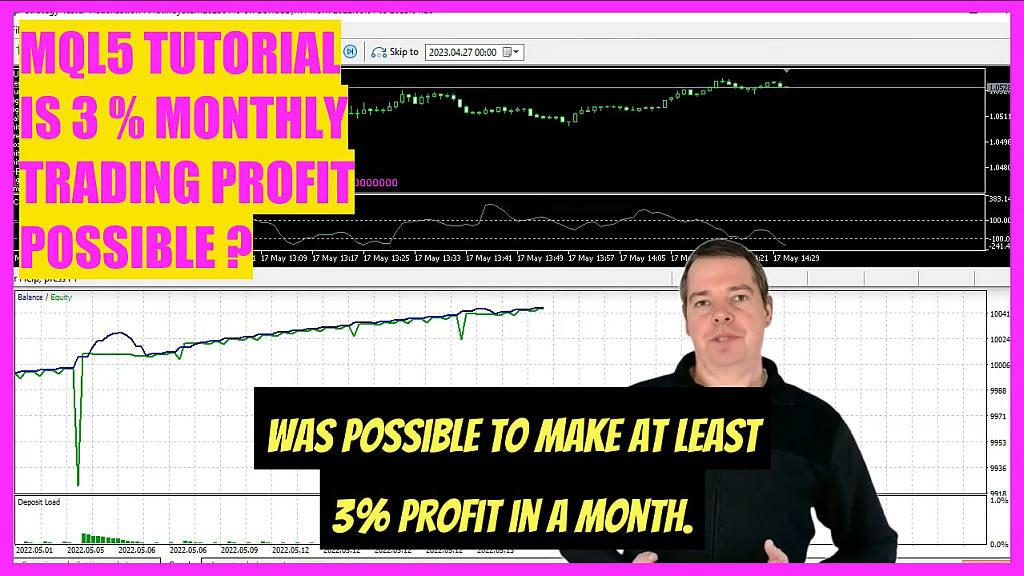
(00:00) Request for 3% Monthly Profit in Trading
- The video starts with a mention of a request from an MQL programmer asking if it’s possible to make at least 3% profit per month in trading.
(00:08) Comparison with Warren Buffett’s Returns
- The narrator compares this goal to Warren Buffett’s average annual profit of about 20%, noting that a 3% monthly profit would equate to an annual profit of about 36%, significantly higher than Buffett’s returns.
(00:24) Feasibility of Consistent Profits
- Discussion on whether such consistent profits are feasible, emphasizing that the challenge lies in achieving profitable solutions over a longer period and maintaining at least 3% per month.
(00:40) Focus on Minimizing Mistakes and Losses
- The initial focus for beginners should be on minimizing mistakes and losses, especially in the initial phase, rather than optimizing profits.
(00:56) Variability of Monthly Profits
- Highlighting that each month in trading can be different, and profits from automatic trading should not be expected as a regular salary.
(01:07) Emotional Challenges in Trading
- Discussing the emotional aspects of trading, including the tendency to question and want to improve one’s own system, leading to potential mistakes and frustration.
(01:28) Emotional Decision Making and Its Consequences
- Explaining how emotions can lead to uncomfortable situations or rash decisions in trading, often with disastrous results.
(01:44) Trading as Statistical Probabilities, Not Gambling
- Clarifying that trading is more about statistical probabilities than fortune-telling or gambling, and deviations from the norm can occur.
(01:55) Importance of Sustaining a Trading System
- Emphasizing the importance of sustaining one’s own trading system over a long period, regardless of whether it’s automatic or manual trading.
(02:06) Developing a Solid Strategy and Avoiding Emotional Decisions
- The key to success in trading is developing a solid strategy, sticking to one’s own rules, and avoiding emotional decisions.
(02:22) Realistic Expectations and Continuous Learning
- Advising on having realistic expectations in trading, understanding it’s not a fast track to riches, and the importance of continuous learning and adapting to market conditions.
Today I got another request from an interested, starting MQL programmer who asked me if it was possible to make at least 3% profit in a month. In fact, I heard that even Warren Buffett as an investor can only make about 20% profit in a year and he is one of the richest men in the world. A 3% monthly profit would equate to an annual profit of about 36%, which is much higher than Warren Buffett’s average return. Now, does that mean that’s not possible?
Well, actually it is rather the case that a profitable solution over a longer period of time is difficult to implement if you want or need to achieve at least 3% per month. The idea is basically not to make a particularly high profit immediately, but to make as few mistakes as possible, especially in the initial phase, and to lose as little money as possible. The majority of all beginners lose a large part or even the entire trading capital within a few months. So the first step is not to optimize profits, but to limit losses while you are still learning and have enough capital. The second problem with this is that every month is slightly different. You can’t think of profits from automatic trading as a regular salary. There may be months when you make minus. In return, you may make a little more plus in another month. In addition, there is the problem that people always tend to question their own system and want to improve it.
If you can’t stick to your own rules, you will realize by the third or fourth exception at the latest that you did exactly the wrong thing at exactly the wrong time. This can lead to being frustrated and out of that comes such things as revenge trades. Humans are emotional and that leads to situations always arising where we feel uncomfortable or do rash things. The intention behind it may be good, but often the result is quite disastrous. Many people also see automatic trading as a kind of fortune telling or a substitute for gambling. But in fact it is more about statistical probabilities. And that means that there can be deviations from the norm.
An average profit expectation does not mean that you should expect that for every week or month you trade. If you are not able to sustain your own trading system over a long period of time, you will basically have a hard time. Regardless of whether you prefer automatic or manual trading. To be successful, it is important to develop a solid strategy, stick to your own rules and avoid emotional decisions. This is the only way to be successful in trading in the long run and make steady profits. At the same time, one should have realistic expectations and be aware that trading is not a fast track to riches, but rather a discipline that requires time, patience and constant learning.
Constant testing and adapting to changing market conditions is essential to be successful in the long run.




